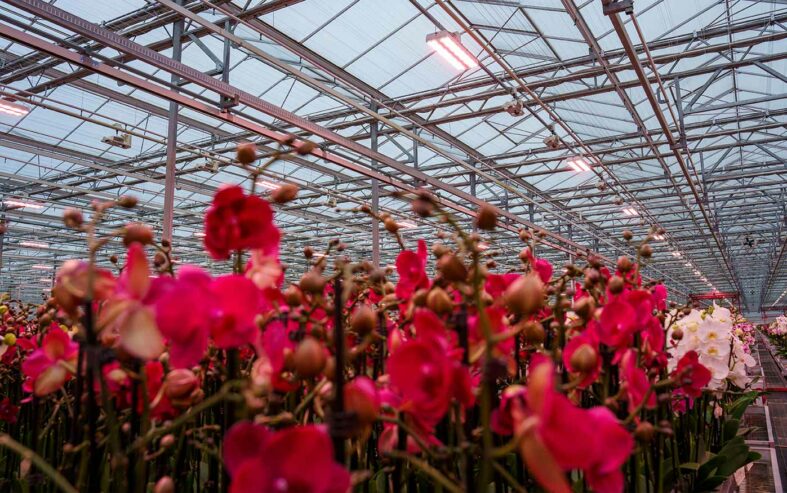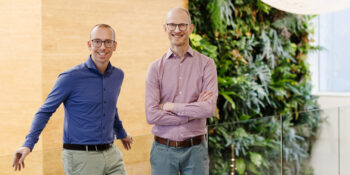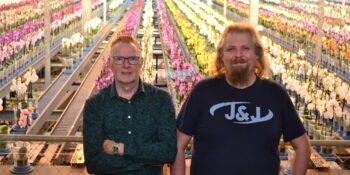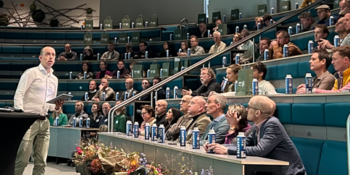Growing is in the Bernhard family’s DNA. Over a century ago, the grandfather of the current owner, Bram Bernhard, cultivated vegetables for the city of Amsterdam. In 1963 the nursery began specialising in roses and went on to add orchids and container plants earlier this century. This diverse mix of crops is grown carbon neutrally.
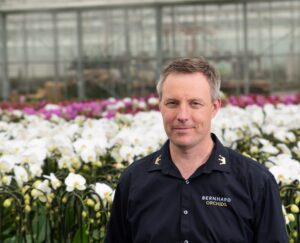
Bram Bernhard
These days, the MPS-ABC, MPS-SQ and MPS-GAP certified nursery operates multiple sites with three main crops. “We have eight hectares of cut roses, six hectares of Phalaenopsis and eleven hectares of garden plants like Sundaville, Thunbergia and Passiflora,” Bernhard says.
“We introduced orchids in 2008. They combined well with our rose production, as the surplus heat we generated was ideal for heat-loving Phalaenopsis. In 2012 we took over the business next door, a container and patio plant nursery. This put our heat supply out of balance, so we switched to geothermal energy. Following some initial technical challenges, it’s now running very well.”
Energy reservoir
The business focuses on practical growing solutions with a strong emphasis on sustainability. “With geothermal energy, we save twenty million cubic metres of natural gas and can heat our greenhouses completely fossil-free,” Bernhard explains. “We also have 60,000 solar panels that generate 20 million KW of power annually, which meets our LED lighting needs. Because we work with Guarantees of Origin (GoO), our electricity is certified as sustainable. In summer we supply sustainable electricity into the grid, while in winter we purchase power with a sustainable label.”
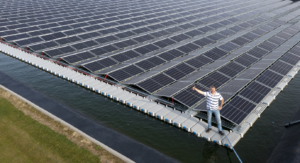 This ‘battery function’ is an important yet often overlooked additional benefit of horticulture in the Netherlands. “Thanks to features like CHPs (combined heat and power unit) and controllable LED lighting that fulfil the role of a battery, Dutch horticulture provides 2000 MW of balancing power. We are very proud of this. Whereas in Scandinavia reservoirs play a role in grid balancing, here in the Netherlands, we as a sector fulfil that role in the energy market: we absorb excess power and can feed it back in the event of a shortage.”
This ‘battery function’ is an important yet often overlooked additional benefit of horticulture in the Netherlands. “Thanks to features like CHPs (combined heat and power unit) and controllable LED lighting that fulfil the role of a battery, Dutch horticulture provides 2000 MW of balancing power. We are very proud of this. Whereas in Scandinavia reservoirs play a role in grid balancing, here in the Netherlands, we as a sector fulfil that role in the energy market: we absorb excess power and can feed it back in the event of a shortage.”
Downward trend in chemical use
Bernhard consequently takes pride in his nursery and highlights this through the MPS certifications. But he is also proud of the sector as a whole: “As a sector, we are doing our utmost. You can see that in the downward trend in the use of chemical crop protection, for example. By using alternatives like products categorised as green, mechanical trapping and suction methods and biocontrols, we have significantly reduced our chemical use here in the nursery: we now use ten times less than we did twenty years ago.”
Careful water management is another good example of Bernhard’s efforts, which are representative of the positive developments in the sector. “We collect rainwater from our solar panels and use it for irrigation, so we avoid using groundwater or surface water. All our water is recycled, and we don’t discharge any into the ground or surface water.”
Bernhard concludes: “Together we produce the most beautiful flowers and plants in a sustainable way. As a sector we should be communicating this with pride, to counter the undeserved negative attention we sometimes receive.”
